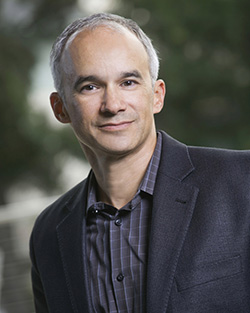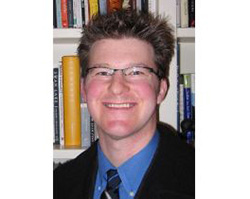
Well-known author and Professor of Law Ian F. Haney López investigates the intersections of identity, government, and economics with his keynote address at the 2016 Campus Dialogue on Race, on Thursday, Nov. 3 at 6 p.m., in HSU’s Kate Buchanan Room (download campus map PDF).
The Campus Dialogue on Race takes place from Monday, Oct. 31 to Friday, Nov. 4. Events include:
- The Queer & Trans* People of Color Dialogue on Tuesday, Nov. 1 at 5 p.m. in Library 114.
- The Post Traumatic Slave Syndrome: Examining the Work of Dr. Joy DeGruy Workshop on Wednesday, Nov. 2, at 7 p.m. in the Goodwin Forum
- Question and Answers with Author Arisa White on Thursday, Nov. 3, at 1 p.m. in the Library Fish Bowl
López’s lecture “Anger and Politics: Exploring the Connections Between Race, Democracy, and Economic Inequality” is one of the highlights of the 2016 Campus Dialogue on Race, which takes place from Monday, Oct. 31 to Friday, Nov. 4.
López holds an endowed chair as the John H. Boalt Professor of Law at the University of California, Berkeley, where he teaches in the areas of race and constitutional law. He is also a Senior Fellow at Demos and the director of the Racial Politics Project at the Haas Institute for a Fair and Inclusive Society. He is also likely the only person to have been a classmate of President Barack Obama’s on two occasions: once as a high school student in Hawaii and later as a law student at Harvard Law School.
López’s most recent book is “Dog Whistle Politics: How Coded Racial Appeals Have Reinvented Racism and Wrecked the Middle Class.” In a 2014 interview on Democracy NOW!, Lopez explained his views that racially coded statements—which he calls dog whistle statements—are a major element of modern politics.
He cites examples like President Ronald Regan’s infamous “welfare queens” remark, or Newt Gingrich labeling President Obama a “food stamp president” during the 2012 Republican primaries. “New public racism is coded and always operates on two levels. On one level triggering racial anxiety and on another allowing plausible deniability,” said López in the interview.
Lopez also argues that racism is nothing new, but rather has been central to American politics for centuries. The development of “dog whistle” statements has made racism more insidious and harder to detect than ever before. He traces the origin of coded racism to the late 1950s and early 1960s and the campaigns of George Wallace and Barry Goldwater.
He goes on to say that such dog whistle statements represent a direct attack on the middle class in two ways. First, dog whistle statements are used to support the argument that minorities represent a threat to the welfare of the middle class and, secondly, that the government gives unfair advantages to minorities through assistance programs. Both factors serve as a distraction to what López says is the biggest threat to society: the concentration of wealth at the top of the income scale.

Leading up to the keynote, Benjamin Madley will deliver a lecture on Tolowa genocide on Wednesday, Nov. 2, from 11 a.m. to 12:30 p.m., in the Native American Forum. He will also give a lecture on the question of genocide in American history on Wednesday from 5 to 7 p.m. at the Native American Forum. On Thursday, Nov. 3, from 11 a.m. to 1 p.m. in the HSU Library Authors Hall, Madley will talk and answer questions about his book, “An American Genocide: The United States and the California Indian Catastrophe, 1846-1873.”
Benjamin Madley is a historian of Native America, the United States, and genocide in world history. Born in Redding, Calif., Madley spent much of his childhood in Karuk tribal lands in Northern California where he became interested in the relationship between colonizers and indigenous peoples.
In a 2016 editorial in the Los Angeles Times, Madley wrote “Neither the U.S. government nor the state of California has acknowledged that the California Indian catastrophe fits the two-part legal definition of genocide set forth by the United Nations Genocide Convention in 1948.”
He goes on to write, “Historical veracity demands that we acknowledge this state-sponsored catastrophe in all its varied aspects and causes, in order to better understand formative events in both California Indian and California state history.”
“An American Genocide” documents the extent of the killings and their horrific consequences. The book includes nearly 200 pages of appendixes listing all known incidents of violence involving California Indians.
About the Campus Dialogue on Race
HSU Campus Dialogue on Race started in 1998, spurred by President Bill Clinton’s Initiative on Race. Over the years, HSU has been committed to creating safe spaces for this dialogue. The dialogue provides an opportunity for students, faculty, staff, and the community to experience workshops, keynote speakers, poster sessions, panel discussions, and dialogues exploring the impact of race.
For more information, visit humboldt.edu/dialogue.